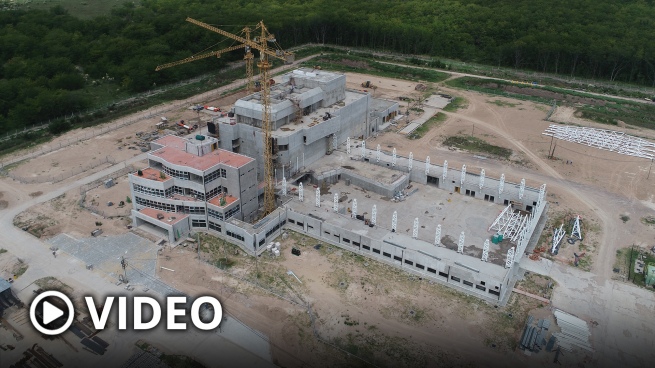Shortly after finishing the civil works of the Argentinian Multipurpose Nuclear Reactor RA-10the project manager of the National Atomic Energy Commission (CNEA), Herman Blauman, he remembers the beginnings in 2010 and feels “an enormous pride, for the work and for the country. These are difficult times and we are about to finish”.
The installation of the new reactor is located in the Buenos Aires town of Ezeiza and will have applications in health, science, technology, and industry. “It is a project carried out by the CNEA with financing from the National State. Right now more than 60 companies are involved and there are around 1,500 direct jobs”indicates Blaumann and estimates that in August of this year the civil works will be completed and that by the end of 2023 the tests to verify the operation of the different systems will be completed, which will be followed by other safety tests until the operating license is obtained in 2024 .
“We have had a very good budget follow-up -reports the manager- in 2021 we executed 4,300 million pesos and this year the budget will be 9,300 million pesos. At the moment, the investment in the project is 265 million dollars”. The CNEA was in charge of the design of the new reactor together with INVAP, which is also involved in the installation and supply of components together with other companies.
The RA-10 will replace the RA-3 reactor (which began operating in 1967 and will continue to operate for academic purposes) to supply radioisotopes for medical, industrial and agricultural use to Argentina and also to other countries.
Regarding its application in health, Blaumann points out that currently “One out of every one hundred Argentines per year requires a SPECT study with a Gamma camera, for example, when a scintigram is done. These studies are carried out with a radioisotope called molybdenum that today is produced in the RA-3 reactor”.

In addition to ensuring the self-sufficiency of radioisotopes, it is estimated that the RA-10 will be operational at a strategic time of great demand worldwide because in 2025 several reactors in other countries will go out of service due to the end of their useful life. “We intend to capture 20 percent of the world market,” Blaumann predicts, adding that “it is a facility that will be able to export around 50 million dollars per yearit is an export with a high added value”.
In the country there are about 300 centers that carry out nuclear medicine studies and receive radioisotopes from the CNEA. In addition, the new facility will have laboratories for nuclear fuel testing and for studies with neutron techniques in different disciplines such as biology, chemistry, physical paleontology, geology, pharmacology and materials science, among others.
This is possible because the reactor will generate neutrons, which are particles whose properties allow the structure of matter to be interrogated non-invasively and to know its state or characteristics at the molecular level through neutron diffraction.
In the Argentine Laboratory of Neutron Beams (LAHN) that will have 14 instruments and the participation of more than 55 institutions in the country, 11 universities and the National Council for Scientific and Technical Research (CONICET) studies of this type will be carried out. “The interesting thing about working with neutrons is that they interact with matter in a very different way than other particles do,” explains the director of the LAHN, Karina Pierpauli.
Among the examples, he mentions that after watering a plant with neutron techniques, it is possible to observe how the water is distributed through the small channels of the plant, from the roots to the leaves, and, with this information, optimize the process of fertilizing crops or the machinery agricultural for irrigation.
“Neutrons also allow us to obtain more knowledge in the area of medicine, to understand how some diseases develop, as well as to design smart drugs so that the treatment is more effective”adds the chemical engineer.

Another of the many applications will be in the area of paleontology, since in the LAHN fossils can be observed without the need to remove them from the rock or material that surrounds them, which saves time and minimizes the risk of deterioration. “Furthermore, through certain programs all the cavities can be reconstructed, even deducing which nerves passed through”, wide Pierpauli.
To understand how neutrons work, we must consider that they only interact with the nuclei of the atoms that make up matter. “Atoms have a very small nucleus compared to their volume and then they have an electronic cloud that surrounds the nucleus”, describes the director of the LAHN. That is why, unlike X-rays, the neutron can penetrate several centimeters into matter until it finds a nucleus and researchers obtain information from these interactions (such as changes in direction or energy).
“With neutrons – describes the engineer – it is possible to know what is happening inside the sample and also to evaluate it in complex environments such as chemical reactors, ovens and machines”.
The LAHN will also have applications in industry through the analysis of wear, cracks and stresses of, for example, the rails of a train and thus predict where it can fail or break and calculate when it should be replaced.
“We are going to study materials and components that can be transferred to the industry. Whenever there is a large facility such as the RA-10 complex, technological development is generated around it and the opportunity to impact the gross product of a country”, Pierpauli advances.
In the scientific field, given that there are currently very few laboratories of this type in the southern hemisphere, the LAHN will attract international researchers, which will allow the generation of scientific collaboration agreements and the exchange of hours of use of instruments between countries.

In terms of safety, the complex complies with international standards and with all the national regulations of the Nuclear Regulatory Authority. Besides, “This is a 30-megawatt experimental reactor, its power is many times less than that of a plant used to generate electricity”Blaumann points out.
Regarding the LAHN, Pierpauli details that “in most techniques, in general, the neutron flux used does not imply a risk that the material will be activated”. In addition, before the exhibition, it is verified that the sample does not have elements that remain active for a long time. In any case, after the experiment, tests are carried out to verify that the material does not have a risky dose of radiation and if it does, it is reserved in a space prepared for activated samples.
The LAHN will offer a variety of complex and cutting-edge neutron techniques that complement the information obtained by other more accessible and frequently used techniques to address relevant scientific questions.
“Concreting this project is good for us Argentines. Installations of this type exist in the United States, Germany, Australia and China. To which is added that we have the capacity to design and build a reactor with these characteristics”, says Blaumann.
In the same sense, Pierpauli concludes: “It is a source of pride, it is national technology for the development of our country and it also continues to position us as one of the leading countries in the peaceful uses of nuclear energy.”


















